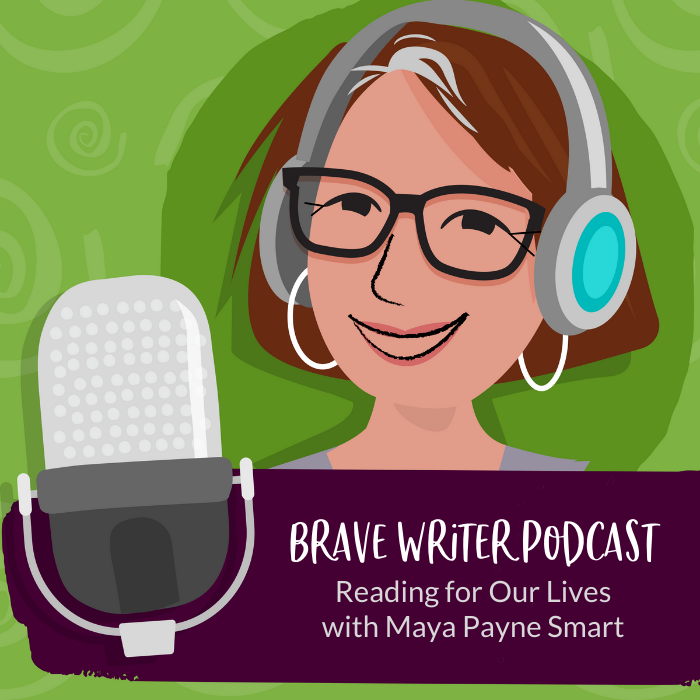Podcast: Reading for Our Lives with Maya Payne Smart

Maya Payne Smart is a writer, parent educator, and literacy advocate who has served on the boards of numerous library and literacy organizations. She and her family live in Milwaukie, Wisconsin where she serves as affiliated faculty in Educational Policy and Leadership in the College of Education at Marquette University. At her website, MayaSmart.com, she provides tips and tools for parents to nurture, teach, and advocate for kids on the road to reading.
Maya’s new book, Reading for Our Lives, provides a powerful action plan to encourage and foster literacy skills in children from birth through six years of age. One of the beautiful things about this book is how well her philosophy dovetails with those of Brave Writer.
Show Notes
For many homeschooling parents, teaching kids to read is one of the biggest and scariest challenges in early education. We may hope that our kids will learn through immersion—and in fact, that is how some learn—but it’s not a guarantee, and parents have to be prepared to provide their own guidance.
In her book, Maya offers six levels that parents can pull to facilitate a language-rich pre-reading context:
1. Conversation
We grow our kids’ vocabulary through conversation. As we talk with them, they are learning the meaning of words, the context in which to use them and labeling things in their environment. Through exchanges in dialogue, our kids’ brain function and structure grows—even before they are verbal themselves.
2. Reading
The first thing we often think about when it comes to literacy is, of course, reading. There is a certain magic to reading that can create incredible memories for our kids, expand their vocabulary, and stretch their imagination. Reading is also incredibly accessible, whether it’s books from the library or labels and signs around the house or neighborhood.
3. Explicit teaching
While kids can learn a lot simply through exposure, there are some things that may just have to be outright taught. Letter names, shapes, and sounds for instance are harder to get naturally and can often be streamlined with the hard-won insights we adults may have. For instance, many kids may not realize that all letters are made up of just three elements: Lines, dots, and curves. Once they realize this, the act of building shapes and letters becomes so much simpler.
4. Connecting
We all have connections in everyday life that can be used as teaching resources: Friends, family, librarians, and parents of other children can all help aid in the development of your kid’s literacy. These people can also often provide information on other resources within your community.
5. Budgeting
People are beginning to doubt the public school system to teach their kids reading skills, and more and more parents and guardians are paying tutors or private educators to aid their children. There are also other investments, such as going to museums, that can aid in our children’s learning. While this may not be for everyone, it is a common lever people are using to get reading outcomes for their kids.
6. Advocacy
Each child walks their own path, and each school is going to approach teaching differently. Parents can advocate both for their community and support good schools, but it also means advocating for your kids’ own needs.
Teaching kids literacy is about the long game. It’s about taking small actions regularly that are going to support learning, but it’s not going to happen overnight. The important thing is to realize that the things you do contribute to your child’s learning and how to support that every day.
Resources
- Website: MayaSmart.com
- Instagram: @mayasmarty
- Read: Reading for Our Lives, publishing August 2nd
- Growing Brave Writers
- Brave Learner Home Special Offer
- Want help getting started with Brave Writer? Head over to bravewriter.com/getting-started
- Sign up for the Brave Writer newsletter to learn about all of the special offers we’re doing in 2022 and you’ll get a free seven-day Writing Blitz guide just for signing up: http://go.bravewriter.com/writing-blitz
Connect with Julie
- Instagram: instagram.com/juliebravewriter
- Twitter: twitter.com/bravewriter
- Facebook: facebook.com/bravewriter


















